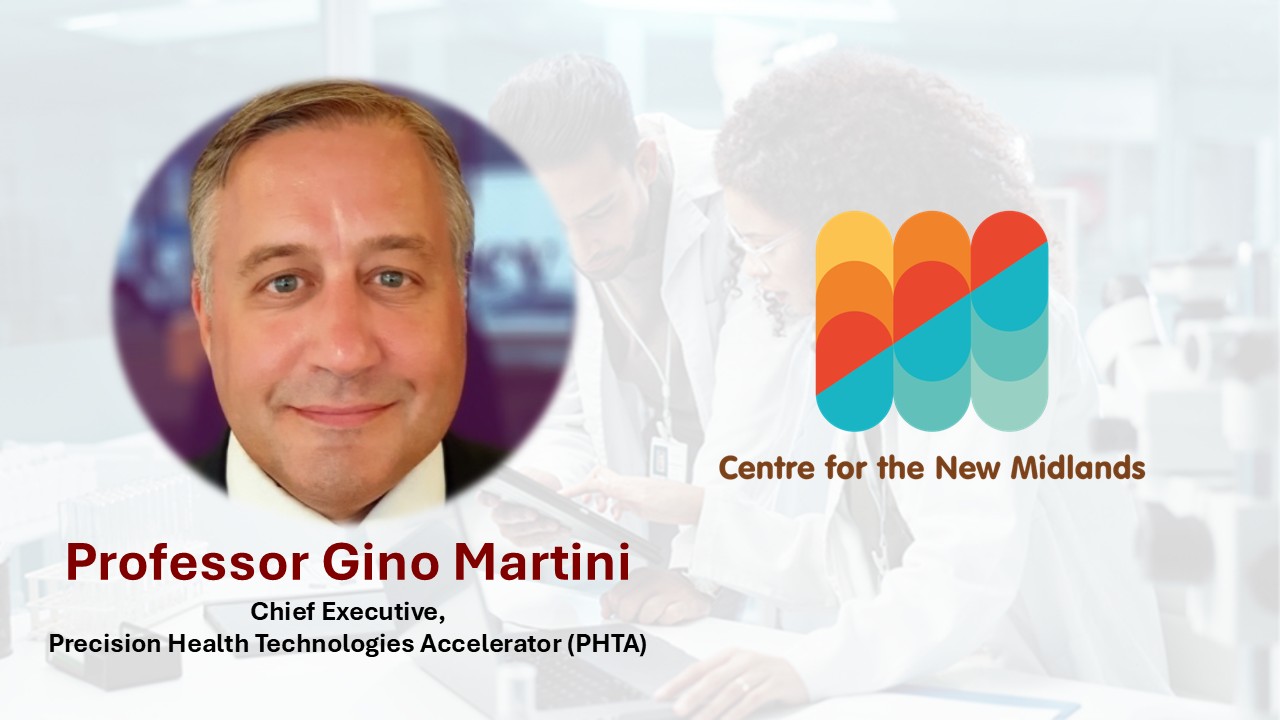To celebrate the opening of one of the region’s most exciting new initiatives, we invited Professor Gino Martini (Chief Executive, Precision Health Technologies Accelerator – PHTA Ltd) to tell us more about this new centre of excellence for the West Midlands and why it is the right project at the right time for the region.
(July 2025)
The UK’s second city has a long history of innovation, creativity and forward thinking. The birthplace of the Industrial Revolution, Birmingham was once hailed as ‘the city of a thousand trades’ – the world’s first manufacturing city. Although dominated by the automotive industry in the 20th century, a new sector is emerging as the champion of the region – and it’s one that may surprise.
With a unique concentration of prestigious education, research and clinical institutions, Birmingham is one of the few global cities truly equipped to become an international leader in health and life sciences.
The pedigree certainly exists – here, pacemakers and plastic heart valves were developed; the first artificial vitamin (Vitamin C) was synthesised; allergy vaccines were pioneered; the key components of artificial blood were synthesised; and the first clinical trials of the contraceptive pill outside the US were carried out.
Quietly, the region has been building one of the most dynamic data-driven healthcare and medtech economies in the UK. Home to an estimated 391 companies, the life sciences sector in the West Midlands employs around 34,000 people, turning over £16.4bn per year and contributing £3bn in GVA annually. Small to medium enterprises (SMEs) make up 90% of the sector, including 111 micro-businesses, with an average annual growth rate of 3.8%. Of these companies, 59 are classified as high-growth firms – growing at over 20% annually.
This growth, and the huge potential in the city, were recognised in 2020 by the-then Department for Business, Energy and Industrial Strategy (BEIS), who conferred ‘Life Sciences Opportunity Zone (LSOZ)’ status on Birmingham – one of only six sites to receive this designation.
Centred around the Birmingham Health Partners ecosystem – which brings together academics from the University of Birmingham, Aston University and six research-intensive and specialist NHS Trusts – the LSOZ ably demonstrates that the city has all the vital ingredients for health and medical innovation. But one element has, until recently, been in short supply – lab space.
With a lack of grow-on space for expanding companies, life sciences businesses have been forced to look outside Birmingham for larger lab and office accommodation – taking talent, jobs and ultimately money away from the local economy.
This trend, however, did not go unnoticed. The University of Birmingham and West Midlands Combined Authority recognised the growing demand for specialised grow-on facilities for spin-outs and SMEs scaling up from incubators. Importantly, they also acknowledged that supporting these businesses to succeed would mean going far beyond offering lab space – that Birmingham’s expert clinical-academics were ideally placed to help industry partners to develop, validate and commercialise their health solutions.
Birmingham Health Innovation Campus
A 10-acre former brownfield site in Selly Oak, Birmingham Health Innovation Campus (BHIC) is the University of Birmingham’s answer to the question – how do we keep innovative life sciences companies in the region? Developed in collaboration with Bruntwood SciTech, and with the support of Birmingham City Council, the campus – which has just opened the doors to its first building, No.1 BHIC – will provide a total of 657,000 sq ft of state-of-the-art lab, office and incubation space. When the ten-year masterplan is complete, BHIC will be the largest science park of its kind to be co-located with a leading research-intensive University and major NHS Trusts, as well as being the only science park in the West Midlands dedicated to health and life sciences.
The focal point of this first phase of development is No.1 BHIC’s anchor tenant – the Precision Health Technologies Accelerator (PHTA). Occupying 65,000 sq ft over the top three floors of the building, PHTA is the University of Birmingham’s flagship life science research hub. PHTA provides Category 2 lab and office space for up to 20 SMEs – as well as catalysing vital collaborations with key opinion leaders in an array of medical and scientific specialties. It is also home to the core capabilities for the campus that will support the commercial businesses based there: Clinical Immunology Services, PHTA Industry Trials Hub, and medtech Makerspace.
What’s notable about PHTA is that it isn’t a refurbishment or repurposing of existing facilities – it has been custom-designed by scientists, for scientists, and the scope for sustained growth is almost limitless: the wider ten-year masterplan for BHIC will provide opportunities for bespoke facilities in forthcoming buildings, allowing successful PHTA residents to graduate to larger labs in subsequent BHIC phases. Overall, the development is set to create over 10,000 new jobs and contribute £400m GVA to the regional economy during the 2030s.
Businesses working with PHTA also benefit from comprehensive support from the earliest stages of innovation – including intellectual property protection and advice on investment and financing – as well as access to a talent pool of some 7,000 life sciences graduates per year. Ultimately, its aim is to make it as easy as possible for the region’s entrepreneurs, spin-outs and growing businesses to find the talent, expertise and facilities they need to thrive – benefiting patients and our local communities.
PHTA will act as a catalyst and a home for collaborative interactions between academics, entrepreneurs and clinicians with complementary skillsets, who can come together to accelerate innovations in a way that just can’t be done when the talent and experience isn’t under one roof. The result will be innovative new treatments, diagnostic tools, health technologies and medical devices which can reach patients faster.
People and place
It’s significant that this is taking place in Birmingham for another reason too – its people. With a large, stable and diverse community, we are a ‘world within a city’, representing the global population in terms of its ethnic profile and socioeconomic demographics. For example, 52% of Birmingham’s residents are of a Black, Asian or minority ethic background. It is also a young city, with 72% of the population aged under 45. When it comes to clinical trials of drugs and devices, this is invaluable – where trials have diverse, representative participants, their results are applicable to a greater number of people too.
Building health resilience
The strengths that Birmingham and the wider Midlands region can offer life science businesses, are the strengths the sector is crying out for. Not just in basic science, but in clinical trials design and delivery, biomarker analysis and diagnostic development, medical technologies and devices, and regulatory support. While traditionally life sciences businesses have been clustered around the ‘Golden Triangle’ of London, Oxford and Cambridge, expanding lab provision in other areas builds resilience and futureproofs the entire UK life sciences sector. PHTA is therefore an inclusive facility open to any SME or entrepreneur – regardless of their origin or current location.
Ultimately, all this research and development is done for patients – to give them access to precision medicine, improved diagnostics and the latest life-enhancing technologies. Everyone should be able to benefit from world-class health innovation, not just those who are local to centres of excellence such as the Golden Triangle.
By keeping life science enterprises in the Midlands, and giving further opportunity to SMEs in the sector, PHTA is set to ensure patients in our region have easy access to life-changing innovations, and the whole region can benefit from sustainable economic growth.
ABOUT OUR AUTHOR:
An experienced academic and industrial pharmacist, Professor Gino Martini has extensive expertise in oncology, rare and infectious diseases, and drug development – as well as policy development and external advocacy.
As the CEO of PHTA – the University of Birmingham’s flagship life sciences research accelerator – Gino is responsible for helping growing businesses to succeed, through making connections to multidisciplinary opinion leaders and providing commercialisation support and expertise.
PHTA is a £60 million state-of-the-art accelerator located within Phase 1 of Birmingham Health Innovation Campus (BHIC), comprising over 100,000 sq ft of incubation, collaboration and training space, located at the heart of the Birmingham Health Partners research and development ecosystem. Together, PHTA and BHIC will generate 10,000 jobs and contribute more than £400 million GVA to the regional economy within the next decade.
Gino joined PHTA in 2021 from the Royal Pharmaceutical Society where, as Chief Scientist, he played a pivotal role in supporting pharmacists during the Covid-19 pandemic and in particular supporting the role of pharmacists as vaccinators. He was also instrumental in highlighting the dangers of Nitrous Oxide abuse in teenagers, the banning of Dintrophenol, and the reclassification of Medicinal Cannabis.
Gino’s career began with Senior Scientist roles at Scherer Drug Delivery Systems and SmithKline Beecham, before joining GSK – initially as Drug Delivery and Strategic Technologies Manager – rising to Senior Directorships across a 10-year stint.
An experienced academic, Gino was formerly Professor of Pharmaceutical Innovation at King’s College London, as well as undertaking visiting professorships and PhD supervision alongside his industry roles. Prior to his appointment at the RPS, he held a variety of commercial, innovative technology-based and medical affairs roles – directing groups in the US, Europe and emerging markets – for Shire Pharmaceuticals and Roche.
Professor Martini has an MBA specialising in SME success and business failure awarded with distinction from the University of Liverpool.
He is a past chair of the Industrial Pharmacists Group of the Royal Pharmaceutical Society, past president of the European Industrial Pharmacists Group and holds Fellowships from the Royal Pharmaceutical Society, Royal Society of Chemistry and European Industrial Pharmacists Group.








